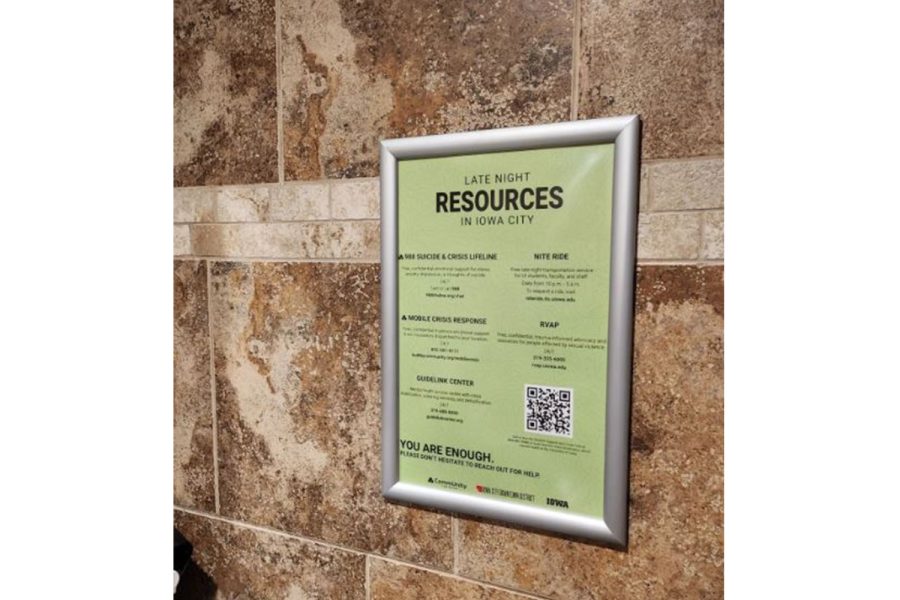New “Late Night Resources” signs debut in downtown Iowa City
Several venues in Iowa City’s hub for nightlife activity are advertising resources available to the community.
April 9, 2023
A new collaboration between the University of Iowa, CommUnity Crisis Services, and the Iowa City Downtown District is bringing awareness to local mental health and late-night safety services.
During the first weekend of April, 28 bars and restaurants in the downtown area debuted green “Late Night Resources in Iowa City” signs featuring a compiled list of phone numbers, websites, and programs aimed to support the community’s well-being.
Each sign has the numbers of the 988 National Suicide and Crisis Lifeline and CommUnity Crisis Services’ Mobile Crisis Response. Anyone experiencing stress, anxiety, depression, or thoughts of suicide can call the hotline.
Additionally, CommUnity’s Mobile Crisis Response will send mental health counselors to the location of callers enduring a mental health crisis. People can also call the service for someone they are worried is experiencing a crisis.
UI Assistant Dean of Wellbeing and Basic Needs Tanya Villhauer said the partnership began with the desire to spread the word about the new 988 number and to bring awareness to the university’s collaboration with CommUnity Crisis.
“We wanted to think together about how we could help to promote both of these resources, for not only students, but also for people in the downtown area,” Villhauer said.
Villhauer said UI Student Life and CommUnity Crisis Services worked together on the design of the signs and collaborated with the downtown district to spread their message about supporting students beyond the classroom.
“This was one small way for us to try to make sure that our people are aware that we care about them and that we have things in place to help support them through difficult times,” Villhauer said.
CommUnity Crisis Services Director of Development Julia Winter added that CommUnity hopes to increase its outreach to college students.
Winter said while anyone in the community could benefit from more information about the resources, it was essential as college students navigate the responsibilities and independent lifestyles away from home.
“Folks start experiencing anxiety and depression more often as young adults, especially with the pressures of schools,” Winter said.
RELATED: UI Student Support and Crisis Line successful in first year
Winter said CommUnity and UI Student Life evenly divided the expenses to pay for around 80 frames, the printing, the lamination, and other costs associated with the sign. Winter estimated the total cost of the project was around $3,100.
Ultimately, Winter said she hopes the signs will encourage people to reach out.
Iowa City Nighttime Mayor Joe Reilly said he hopes the information from the signs will help redirect people toward proper resources instead of automatically calling emergency responders.
“We received feedback from public safety that they’re brought into calls that they really shouldn’t be responding to,” Reilly said. “There’s many different aspects of safety, and this is one that we can help fortify and build up.”
Before putting up the posters, Reilly said he contacted all venues in the downtown district whose hours extend past 10 p.m., with a primary focus on those with alcohol licenses. He noted while the city did not require any businesses to display the signs in their establishments, he received a positive response from everyone he reached out to.
“People who work in these venues are now empowered to share that information and know when they see it. Maybe a patron who is in crisis, they know that they have these resources,” Reilly said.
While it may not own a liquor license, the nonalcoholic Iowa City bar Unimpaired is among the venues that recently added the signs to their establishments.
“We think it’s a really great idea,” Unimpaired manager Matthew Earhart said. “We see a lot of students who are underage, who don’t go to traditional bars, so having those students in here, they’re able to see the same resources as students who go out to traditional bars.”
Reilly hopes people will can feel more comfortable with the idea of reaching out for help if the Downtown District normalizes using the resources.
“I think destigmatizing getting care, getting mental health care, getting detoxing care, and normalizing those things is only going to further strengthen what this community already has for its resources,” Reilly said. “We’re trying to make downtown a more safe, vibrant, and cool place to be.”



